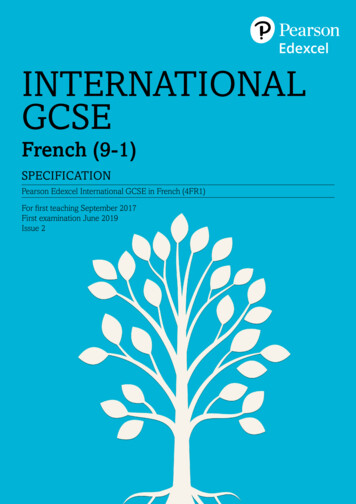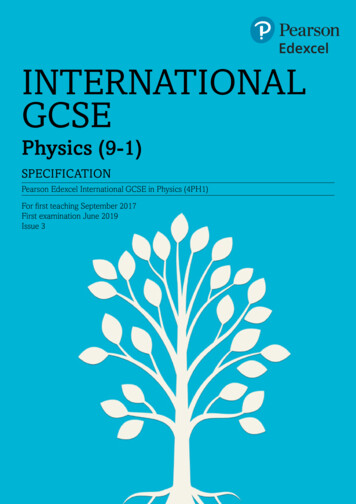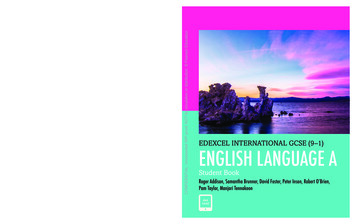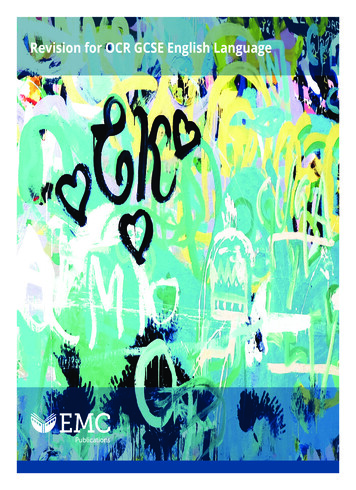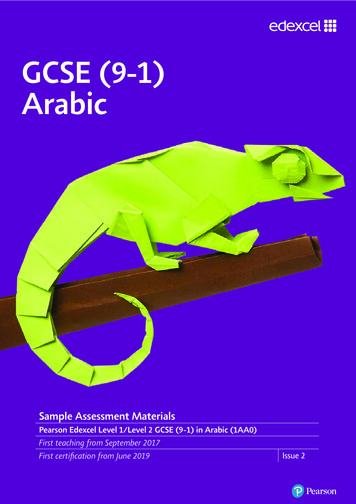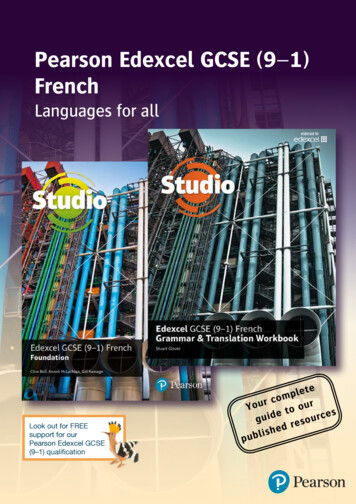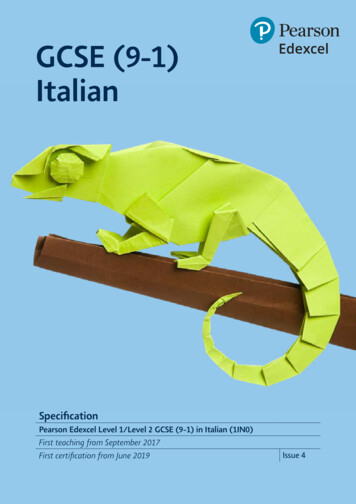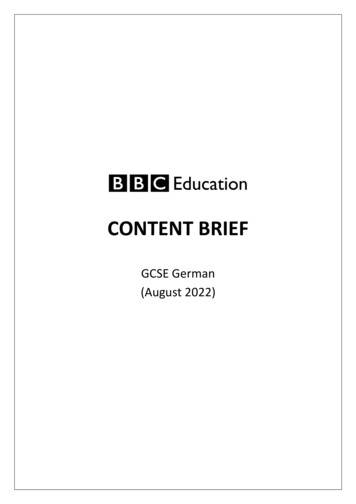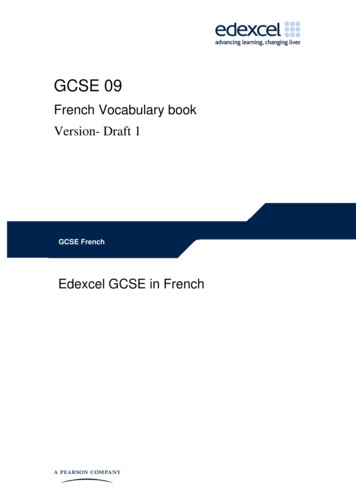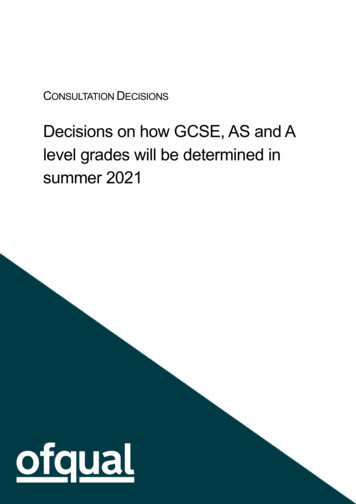
Transcription
CONSULTATION DECISIONSDecisions on how GCSE, AS and Alevel grades will be determined insummer 20211
Decisions on how GCSE, AS and A level grades will be determined in summer 2021ContentsIntroduction . 3Summary of decisions . 3Assessment and evidence . 3Support materials . 4Quality assurance . 5Appeals and results . 5AEA and Project qualifications . 6Other . 6Details. 6Assessments and evidence . 6An autumn exam Series .11Support materials for teachers .12Internal and external quality assurance.13Appeals .15Advanced Extension Award and Project Qualifications .17Other .17Equalities impact assessment .19Regulatory impact assessment.232
Decisions on how GCSE, AS and A level grades will be determined in summer 2021IntroductionAs a result of the disruption to the education of students caused by the Covid-19pandemic, the government considers that exams cannot be held in summer 2021 ina way which is, and which is perceived to be, fair.In reaching this decision the government acknowledged that many schools areproviding high-quality remote learning but there will be an impact on the coverage ofthe curriculum and students’ exam preparation. This impact will vary betweenregions, schools within a region and students.On 15 January Ofqual and the Department for Education (DfE) published a jointconsultation seeking views on how grades should instead be awarded.The consultation closed on 29 January by which time we had received 100,597responses. A full summary and analysis of the responses has been published. Thisdocument reflects Ofqual’s decisions following the consultation and in light of theSecretary of State’s direction to us, as the regulator of qualifications, examinationsand assessments in England.Summary of decisionsHaving considered the responses to the consultation and having had regard to theSecretary of State’s direction, we have decided how grades for GCSEs, AS and Alevels should be determined in summer 2021.Assessment and evidence Teachers must assess their students’ performance, only on what content hasbeen delivered to them by their teachers, to determine the grade each studentshould receive. Teachers can use evidence of a student’s performance from throughout thecourse to inform their judgement. Teachers should determine the grades as late in the academic year as ispracticable, and not confined to a defined window, to enable teaching tocontinue for as long as possible. Schools and colleges should use a broad range of evidence across the taughtcontent to determine the grades before submitting the grades to the examboards. Heads of centres will have to confirm that students have been taught sufficientcontent to allow progression to the next stage of their education, although we3
Decisions on how GCSE, AS and A level grades will be determined in summer 2021will not set requirements about the minimum amount of content that studentsmust have been taught. Students should continue to work on their non-exam assessment (NEA),including for Project qualifications. NEA will be marked by teachers and willcontribute to the overall grade, whether or not is has been completed, but wewill not require exam boards to moderate it. In GCSE, AS and A level art and design, the student’s grade must be basedon the portfolio1 only, whether or not it has been completed. In GCSE English language, GCSE modern foreign languages and A levelsciences (biology, chemistry, physics and geology), centres should determineand submit a separate grade or result for the endorsement. This result orgrade should be based on work that has been completed towards theendorsement. Private candidates2 should work with a centre to provide evidence in line withthe sort of evidence that other students will produce Overall, it will be no easier or harder for a student to achieve a particulargrade this year compared to previous years.Support materials1 Exam boards will provide a package of support materials to include questions,mark schemes, data about how students typically performed in individualquestions and exemplar materials, as well as advice for teachers aboutcontent coverage, topic selection, marking and making grading judgements.This will be based on past questions and will include a proportion ofpreviously unpublished questions for every subject. Teachers will be able to use the support materials immediately followingpublication and until the deadline for the submission of grades. Use of these exam board support materials is not compulsory; they will bepart of the range of evidence teachers could use to determine the grade.At A level the portfolio of work is a Personal Investigation.A private candidate is one who may not be a formal student at a centre but who is entered for thequalification through a registered centre, for example, home educated students.24
Decisions on how GCSE, AS and A level grades will be determined in summer 2021Quality assurance Exam boards will work together as far as possible to ensure that requirementsfor internal quality assurance (QA) and arrangements for external QA areconsistent. Centres’ internal QA arrangements will include consideration of the centre’sprofile of results in previous years as a guide to help them to check that theirjudgements are not unduly harsh or lenient. Exam boards will put in place arrangements for external QA to check eachcentre’s internal QA process and, in a sample of centres, to review theevidence for one or more subjects. Sampling should be both random, andrisk-based. Exam boards will process the grades submitted by centres only aftercompleting, and being satisfied with, any external QA. Exam boards will require centres to submit a declaration by the head ofcentre, confirming that the requirements for internal quality assurance havebeen met.Appeals and results Students will be able to appeal their grade. A student who is unhappy with their grade will first ask their centre to checkwhether an administrative or procedural error had been made. Where a centre does identify an error in the grade submitted to the examboard, it can submit a revised grade and a rationale for the board to consider.If the exam board is satisfied with the rationale, it will issue a revised grade. Where a centre does not believe an error had been made, a student can askthe centre to appeal to the exam board on their behalf. The centre will submitthe student’s appeal to the exam board and provide the evidence on which itsjudgement had been made; the exam board will consider whether, in its view,the grade reflected an appropriate exercise of academic judgement. If theexam board judges that it did not, the exam board will determine the gradethat the evidence would support. The exam board will also check that thecentre had followed its own process. Results days will be on 10 August for AS and A level, and 12 August forGCSE results.5
Decisions on how GCSE, AS and A level grades will be determined in summer 2021AEA and Project qualifications We will treat the AEA and Project qualifications in the same way as GCSE,AS and A levels3.Other We will not prevent exams for GCSE, AS and A level in summer 2021 beingtaken outside the UK. In line with government policy, we will prevent anyexams taking place in the UK. Exam boards will be able to accept entries from any year group and/or age ofcandidate.DetailsAssessments and evidenceStandardIn the consultation we proposed that grades should be based on teachers’assessments of the standard at which their students are performing, and that thegrade should indicate the student’s demonstrated knowledge, understanding andskills. We also proposed that teachers should assess students only on the areas ofcontent they have taught, as requested by the Secretary of State. This is consistentwith the planned approach in other parts of the UK.There was strong support, including from the main teaching unions, for the proposalthat grades should reflect the standard at which a student is working, assessed onlyon the content that their teachers have taught, so that the grade, as far as possible,reflects what a student knows, understands and can do. Eighty-five per cent ofconsultation respondents agreed or strongly agreed with the proposal, and 10%disagreed or strongly disagreed.Teachers will have a good understanding of their students’ performance. They willrefine their understanding through continued teaching and assessment.We have decided that teachers should make a holistic judgement of each student’sperformance on a range of evidence relating to the subject content that has beendelivered by their teacher (either in the classroom or via remote learning).Views about these qualifications were not specifically sought in the consultation but responses toother questions did include opinions about them.36
Decisions on how GCSE, AS and A level grades will be determined in summer 2021We and exam boards will provide more advice about the range of evidence thatcentres will be able to use to support their teachers’ judgements.Centres will also be encouraged, as part of their overall quality assurance, toconsider the grades for this year’s cohort compared to cohorts from previous yearswhen exams have taken place, to make sure they have not been overly lenient orharsh in their assessment of the 2021 cohort.Given that a qualification grade should reflect what a student knows, understandsand can do, we believe this approach is as far as we can go to take account of thedisruption caused by the pandemic, but without breaking the link between students’attainment and the grade they receive. This link is important if grades issued in 2021are to be meaningful for those who use them for selection.We recognise that overall outcomes for 2021 are likely to be different to those ofprevious years given that exam boards will not be in a position to award againststandards established through national examinations as in a normal year.ContentTwo-thirds (66%) of respondents agreed that teachers should be required to assessa certain minimum proportion of the overall content. However, it would be difficult toprecisely define or measure content coverage – different topics and sub-topics in aspecification are not necessarily equal in teaching time or in the types of questionsthat can be asked. When exams take place, there is an expectation that students willhave been taught the whole curriculum, exam papers will sample from that. Studentswill sometimes have a choice of questions, or they might not answer all compulsoryquestions. There is, therefore, no absolute minimum in a normal year.Setting a threshold would potentially mean that students who did not meet thatthreshold, through no fault of their own, could not get a grade, which could be unfair.It is important, that students have been taught enough content to enable them toprogress to the next stage of their education or to employment, but it is difficult todefine precisely what that means for individual students who will have differentplanned progression routes.Therefore we are setting no requirements for the assessment of a minimumproportion of overall content. Heads of centres will confirm that students have beentaught sufficient content to allow progression to the next stage of their education intheir required declaration.TimingIn the consultation we proposed that teachers’ assessment should take place as latein the academic year as is practicable, so that students could continue to be taught7
Decisions on how GCSE, AS and A level grades will be determined in summer 2021for as long as possible. Seventy-seven per cent of respondents agreed or stronglyagreed with the proposal that students continue to engage with their education forthe remainder of the academic year and 15% disagreed or strongly disagreed.In the consultation we set out some of the advantages and disadvantages ofteachers’ assessments using exam board papers taking place in a defined window.However, we recognised that while there would be some benefit in using a windowfor new, unseen material, there would be little to be gained if materials were largelybased on past papers or questions that are already in the public domain.We have therefore decided that teachers’ assessment should take place as late as ispracticable but not be confined to a specific window of time to give teachers as muchflexibility as possible.Range of evidenceWe asked whether work completed earlier in the course, including before theannouncement that exams would not take place, should contribute to the teacher’sjudgement of the grade. Feedback from some students was that work from earlier inthe course may not have represented their best performance. Conversely, manyargued in favour of their earlier work being taken into account by their teachers.There was very strong agreement for teachers to use evidence taken fromthroughout the course. Ninety per cent of respondents agreed or strongly agreed,whereas 6% disagreed or strongly disagreed. We have decided that teachers canuse evidence of a student’s performance from throughout the course to inform theirjudgement.Conditions under which students are assessedWe also asked whether additional assessments should be taken within the student’sschool or college and, if the pandemic makes it necessary, whether a student shouldbe able to take these assessments at an alternative venue, including at home.Respondents expressed concerns about how the authenticity of the work would beensured, with many comments referencing the potential for cheating and thechallenges of exam invigilation outside of the school or college.Given our decisions about the timing of the assessment, we do not believe that weshould specify where the assessments take place. Rather it is for teachers to judgewhat is appropriate and, given the circumstances of the pandemic, whatarrangements they can reasonably put in place. They will want to be confident thatthe work is that of the student but they may need to be flexible about where that workis completed.8
Decisions on how GCSE, AS and A level grades will be determined in summer 2021Non-exam assessmentIt is in the interests of students to continue with their learning for as long as possible.We will, therefore, encourage students to continue with and complete any non-examassessment (NEA), given that subjects only have NEA where the relevant skills orknowledge cannot be assessed by exam. In the consultation, we proposed that, insubjects with NEA, teachers should take account of the student’s NEA whendetermining their final grade.We proposed that students should not be penalised if they had been unable tocomplete their NEA due to circumstances beyond their control caused by thepandemic (for example lack of access to specialist equipment).There was broad support for these proposals, with 90% supporting the proposal thatNEA is taken into account when completed, and 80% supporting the proposal thatpartially completed NEA should be taken into account. Overall, 85% of respondentsagreed that teachers should mark it, with 77% of teachers agreeing with this. Justover half (55%) of respondents supported the suggestion that teachers’ assessmentof NEA should not be moderated. There were opposing views about teachers’marking of NEA and whether it should be moderated by the exam boards. Manyrespondents commented that moderation would not be possible or appropriate dueto the different levels of completion of NEA, as a result of the pandemic and schoolclosures, self-isolation periods and restricted access to specialist rooms andequipment. Conversely, others commented that moderation should take place as it isthe only way for the use of NEA to be fair, to prevent grade inflation and securepublic confidence.Teachers should mark the NEA according to the normal mark scheme (in whole or inpart, depending on whether students have been able to complete their NEA); this willgive teachers an objective source of evidence on which to base their grade decision.Where students have been unable to undertake sufficient work on their NEA toproduce meaningful evidence for teachers to mark, the exam boards will provideguidance on how work they have been able to complete could be considered as analternative source of evidence.The exam boards will not make further changes to the NEA requirements beyond theadaptations already confirmed for some subjects, but NEA that cannot beundertaken in line with the normal requirements could anyway form part of theevidence teachers use to assess their students.We will not require the exam boards to moderate teachers’ marking of NEA this year,for several reasons. First, if not all students are able to complete their NEA, it will bedifficult for moderators to make judgements on incomplete work, and it would not befair only to moderate completed work. Second, moderation is important in a normalyear because the marks from NEA are aggregated with marks from the exam(s) and9
Decisions on how GCSE, AS and A level grades will be determined in summer 2021it is important to ensure consistency; since there will be no exams this year, there isno requirement to aggregate marks. Third, preparing and despatching work formoderation would mean additional workload for centres.Given that teachers’ judgements in 2021 will be based on a number of differentsources of evidence, which will vary from centre to centre, moderating centres’marking of NEA to achieve consistency of marking will be of little benefit in ensuringconsistency of overall judgements.Art and design and endorsementsFor GCSE, AS and A level art & design, which are wholly assessed by NEA,students’ grades will be based on their portfolio only; students should not bepenalised if, due to circumstances beyond their control, they were unable tocomplete their portfolio.We did not ask a specific question about this proposal but views expressed inresponses to the open question were supportive.There were mixed views in the consultation responses, relating to our proposal thatendorsed grades or results should continue in GCSE English language, A levelscience and GCSE MFL in 2021. Some respondents suggested that theseendorsement grades or results should be disregarded and others suggested carryingon with the usual approach, as summarised in the analysis document.Not recording these grades or results in GCSE English language and A levelsciences in 2021 could put students at a disadvantage relative to students inprevious and future cohorts, because their results would appear different. In GCSEMFL teachers have been provided with common criteria to assess their studentslevel of achievement in speaking. We made clear that assessment depended onteachers’ judgements and no recordings or separate evidence of performance wouldbe required. If we now included this in the basket of evidence for judging a students’grade then evidence would be required which would be an additional burden onteachers and students. In some cases, this might not be achievable at all. Therefore,we have decided not to change the arrangements we put in place and to retain theadditional grade (pass, merit or distinction) for speaking.On balance we believe it is in students’ interests that this grade or result is recorded,and that centres will be able to make a judgement based on the evidence they havealready collected.Private candidatesIn the consultation we proposed four options for private candidates: to completeexternally set papers only; to work with a centre to provide the same sort of evidence10
Decisions on how GCSE, AS and A level grades will be determined in summer 2021as for other students; to undertake a separate exam series in summer; or toundertake a separate exam series in autumn.Responses to the consultation expressed concerns that a summer series for privatecandidates would be unfair and create a two-tier system and an autumn series wouldbe too late for students to move to further or higher education in 2021. In addition,reliance on an exam series would be subject to all the risks of disruption due to thepandemic (or other events) that we have previously considered.There was strong support (61%, increasing to 68% from respondents who wereprivate, home-educated students of any age) for private candidates to have, as faras possible, the same experience as other students – working with a centre toprovide a range of evidence to enable teachers to determine a grade. This optionwould allow some flexibility on assessment topics to take account of any missedlearning. While some private candidates’ learning has not been affected, others havebeen disrupted for a variety of reasons including tutors not being available, increasedanxiety, family and caring responsibilities. Working with a centre will provide theflexibility needed to take account of these circumstances.We have decided that private candidates should be assessed in a similar way toother students, by a recognised exam centre using a range of evidence. Thisevidence could include taking the exam board provided assessment materials in asuitable form. Centres will be asked to assess candidates based on what they havestudied, and allowed to conduct assessment remotely.Centres will be supported by guidance to determine the evidence on which gradesfor private candidates will be based, taking into account their different circumstances.The head of centre will need to complete the appropriate declaration to the examboard and the candidate should be aware of the assessment approach the centrewill use.Although Ofqual cannot require particular centres to accept students, we will makesure that exam boards provide sufficient guidance on an assessment approach andsupport materials, as described above, to those centres that wish to carry out thisrole.DfE is exploring ways to make sure there are affordable opportunities for privatecandidates to work with centres, and to encourage centres to work with privatecandidates.An autumn exam SeriesAs noted above, an autumn exam series was not the preferred solution for mostprivate candidates. However, we noted that many students who responded to theconsultation said they would welcome the opportunity to take an exam if they were11
Decisions on how GCSE, AS and A level grades will be determined in summer 2021disappointed with the summer grade. We will consult on whether we should regulatefor an autumn series to be held and open to all students who were expecting to takeexams this summer.Support materials for teachersIn the consultation we proposed that, to help teachers assess their students, examboards should provide a package of support materials, including papers, guidanceand training. Teachers would mark any papers they give to their students.Parents and carers agreed (51%) that exam board papers should be provided, as didteachers (69%) and senior leadership team respondents (72%). Conversely,students (62%) disagreed that exam board papers should be provided. We did notpropose that the papers would be used as formal exams, but instead as a tool forteachers to use, as appropriate, to help them assess their students. However, theproposal to use such papers generated many negative comments in the openresponses to the consultation, including in the context of teacher workload andstudents’ mental health.Exam boards favoured the use of questions from past papers, from which teacherswould be free to select to assess the content that they have taught their students.Past questions also bring certain advantages – the mark schemes have been testedand revised in live marking, exam boards have data that could be used to supportteachers’ judgements about grades to be awarded, and past student work could beused to provide exemplar materials. In addition, exam boards will generally alreadyhave produced modified versions of the questions (for example in large font, ormodified for hearing impaired students, or in Braille) and any errors in the questionsand mark schemes will have been identified and corrected. Some past papers willnot yet have been published.New questions would have untested mark schemes. However, for some subjects inthe later phases of reform, there may not be sufficient past papers to supplyquestions to cover all of the content areas, and exam boards might need to provideadditional resources based on specimen papers, legacy past papers (if appropriate)or provide new questions.We have decided that the exam boards should provide a package of supportmaterials including sets of questions, advice for teachers about content coverage,topic selection, marking and making grading judgements that they could use if theywished to help them assess their students. Most of the materials will use pastquestions. In line with the Secretary of State’s policy, a proportion of previouslyunpublished questions will be included in all subjects.12
Decisions on how GCSE, AS and A level grades will be determined in summer 2021We also asked whether the use of any exam board materials should be compulsory,whether they should include familiar question types, whether teachers should have achoice of topics, and whether teachers should be required to cover a minimumamount of content for each subject. Respondents’ views differed by group butgenerally there was more support for papers not being compulsory to afford teachersmore flexibility. There was support for papers using familiar question types and forassessment to cover a minimum level of content.A compulsory assessment taken by all students would provide a benchmark forstandards. However, this could not accommodate students having been taughtdifferent areas of content and might not be possible for all students to complete inthe current context. Instead, teachers will be able to decide how and on what toassess their students. The conditions under which the papers are used might alsovary widely. And an exam board would not want to withhold a grade from a studentwho, through no fault of their own, had not been able to complete one of theassessments. It would therefore be potentially unfair to enforce compulsory use ofthese materials.We have decided that the use of exam board materials will be optional and not tospecify a minimum level of content coverage to enable flexibility for teachers toensure students are assessed on only that which their teachers have taught them.Internal and external quality assuranceIn the consultation we proposed that exam boards would provide support andinformation for schools and colleges on the requirements for internal qualityassurance (QA), to secure as much consistency as possible about the standard ofperformance required for each grade for each subject.We proposed that internal QA would include: agreement about the approach to assessment, including whether and, if so,how exam boards’ materials and other evidence would be used internal standardisation arrangements, so that all teachers in a centre makingjudgements in a subject did so in a consistent way, including a process forinternal sign off of grades a declaration by the head of centre that the grades submitted had beendetermined in line with the centre’s agreed approach and the exam boards’requirementsWe proposed that external QA should be carried out by exam boards and shouldinclude:13
Decisions on how GCSE, AS and A level grades will be determined in summer 2021 a check that all school and college leaders know what is expected of themand that they have put in place appropriate internal QA arrangements tosupport their teachers sampling, at subject level, the evidence on which grades were basedWe proposed that exam boards should not issue grades to a centre until they weresatisfied with its internal QA and the outcome of any external QA.There was general support from respondents for an internal QA process, althoughthere were some concerns that it should not be overly bureaucratic. There were,though, some suggestions that teachers already do this for NEA and otherassessments and so could be trusted to do it for summer 2021. Many respondentsnoted that putting an internal QA system in place would take a
Decisions on how GCSE, AS and A level grades will be determined in summer 2021 6 AEA and Project qualifications We will treat the AEA and Project qualifications in the same way as GCSE,

